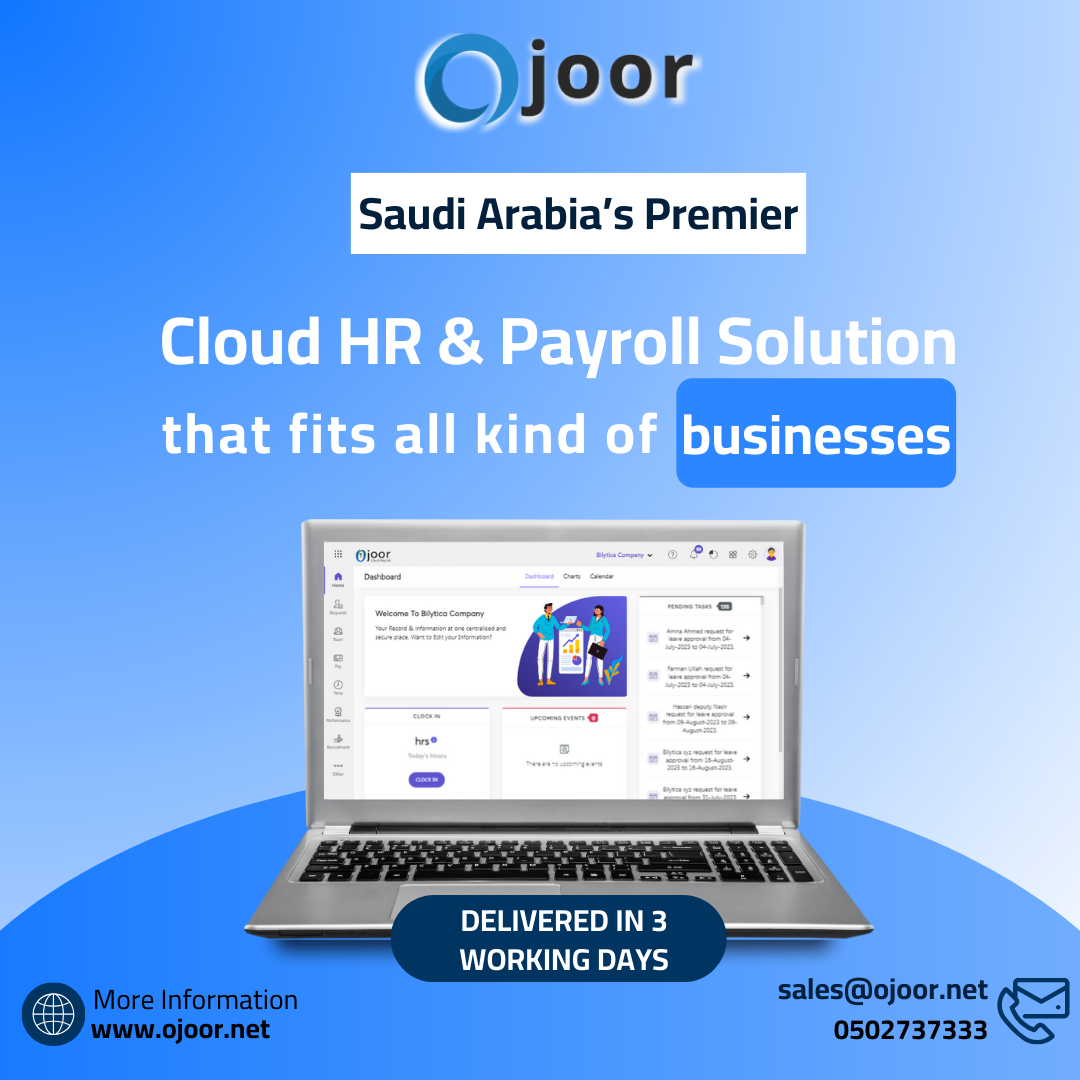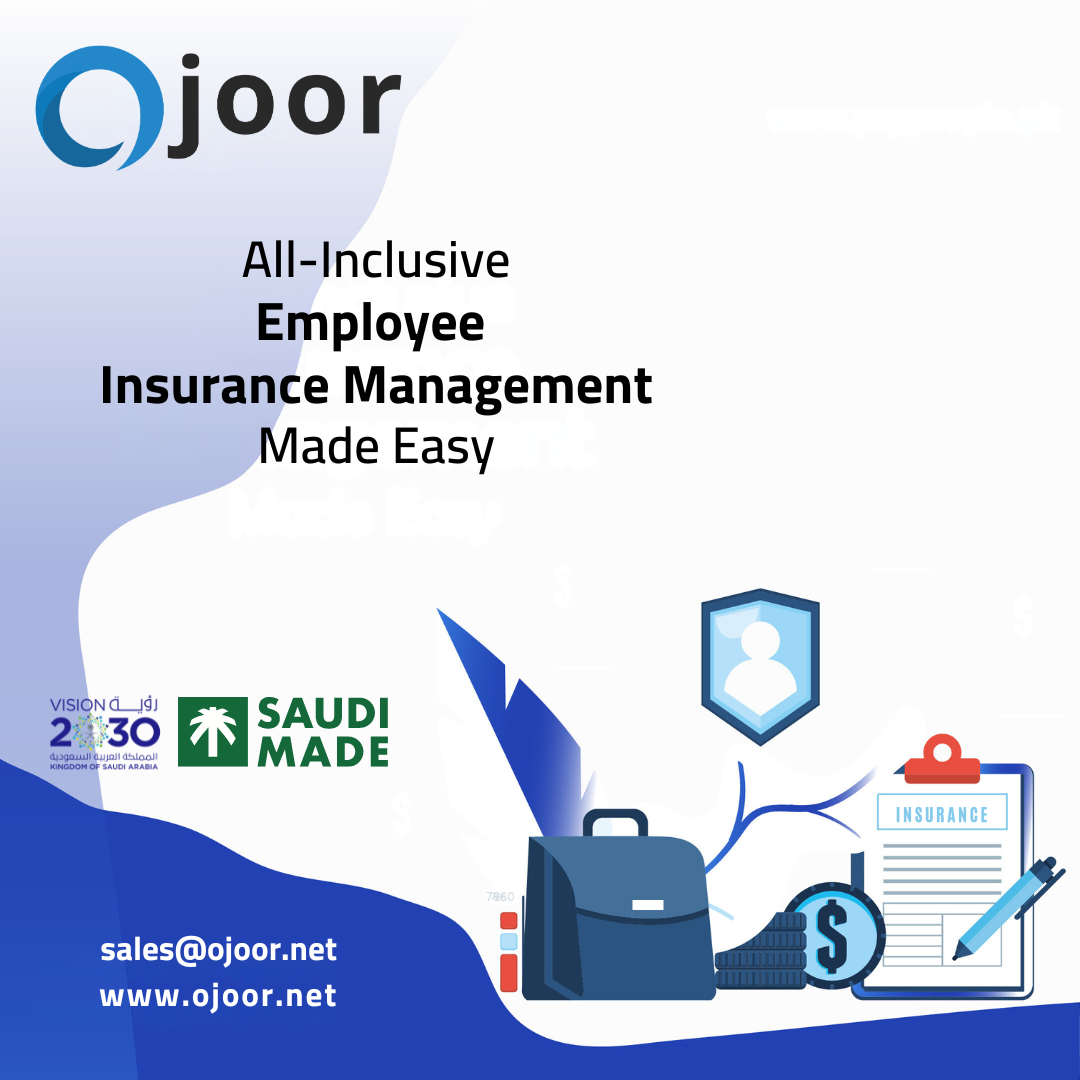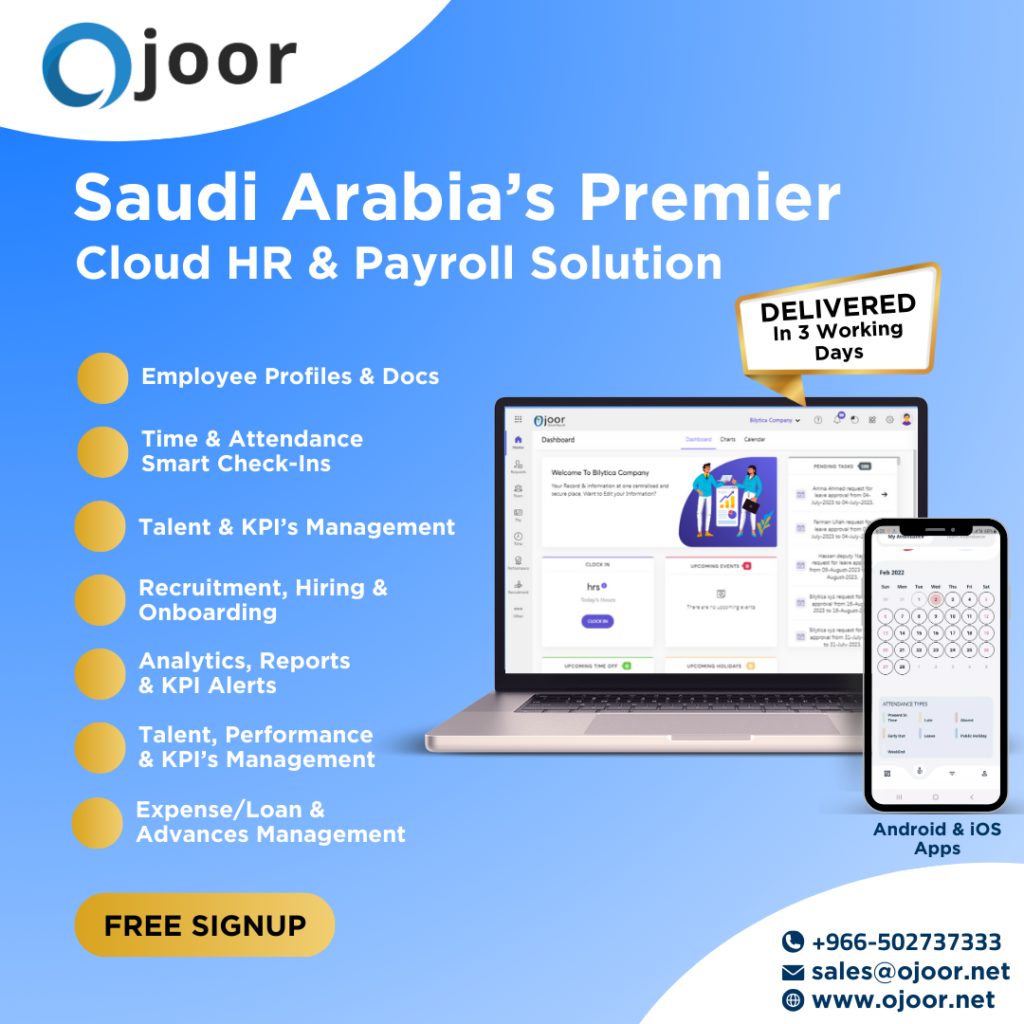Ojoor # 1 is one of the top HR System in Saudi Arabia companies are a significant step towards modernizing HR operations and enhancing organizational efficiency. However, integrating advanced HR technologies presents several challenges that companies must navigate to ensure a successful deployment. From regulatory compliance and data integration to user adoption and system customization, the journey of implementing HR systems can be complex. This article explores the key challenges faced by Saudi companies when implementing HR systems and provides insights into how these challenges can be addressed.
Click to Start Whatsapp Chatbot with Sales
Mobile: +966547315697
Email: sales@Ojoor.net
Ojoor #1 HR System in Saudi Arabia

Regulatory Compliance
HR System in Saudi Arabia has a robust regulatory framework governing labor and employment practices, including the Labor Law and regulations set by the Ministry of Human Resources and Social Development (MHRSD). HR systems must be compliant with these regulations to avoid legal issues and penalties. The challenge lies in ensuring that the HR system is continuously updated to reflect changes in labor laws, such as those related to Saudization, work hours, and employee benefits.
Solution: Companies should choose HR systems that offer regular updates and support for compliance with local labor laws. Working with HR software vendors who have a deep understanding of Saudi regulations can help ensure that the system remains compliant. Additionally, engaging with legal and HR experts during the implementation process can help address compliance challenges proactively.
Data Integration and Migration
Integrating a new HR system with existing legacy systems or other business applications (such as payroll, finance, or ERP systems) can be a complex task. Data migration from old systems to the new HR system involves transferring employee records, payroll information, and historical data accurately and securely. Inaccurate data migration can lead to errors in payroll processing, performance evaluations, and other HR functions.
Solution: To mitigate data integration and migration challenges, companies should conduct a thorough data audit before migration. This involves cleaning and validating data to ensure its accuracy and completeness. Partnering with experienced IT consultants or HR system vendors who have expertise in data migration can also facilitate a smoother transition. Implementing robust data integration tools and ensuring proper testing during the migration process are crucial steps to avoid disruptions.
User Adoption and Training
Successful implementation of an HR System in Saudi Arabia requires that employees and HR professionals effectively use the new technology. Resistance to change, lack of familiarity with the new system, and inadequate training can hinder user adoption. Employees may struggle to adapt to new processes or features, leading to inefficiencies and frustration.
Solution: Investing in comprehensive training programs for users is essential to overcoming adoption challenges. Training should be tailored to different user roles, providing hands-on experience with the system. Offering ongoing support and creating user-friendly documentation can also help ease the transition. Additionally, involving key stakeholders and end-users in the selection and implementation process can increase buy-in and reduce resistance to change.

Customization and Scalability
Every organization has unique HR needs, and the one-size-fits-all Payroll System in Saudi Arabia may not fully meet these requirements. Customizing the HR system to fit specific business processes, workflows, and reporting needs can be challenging and costly. Furthermore, as companies grow and evolve, their HR system must be scalable to accommodate changes in the workforce and organizational structure.
Solution: To address customization and scalability challenges, companies should work with HR system vendors who offer flexible and configurable solutions. Engaging in thorough requirements analysis and planning during the selection process can help identify necessary customizations and ensure that the system aligns with business needs. Additionally, choosing a system with modular capabilities allows for future scalability and expansion.
Data Security and Privacy
Data security and privacy are critical concerns when implementing HR systems, as these systems handle sensitive employee information, including personal details, salary data, and performance evaluations. Ensuring that the HR system complies with data protection regulations and safeguarding against potential security breaches is essential.
Solution: Companies should prioritize HR systems that offer robust security features, such as encryption, access controls, and regular security updates. Implementing strong authentication mechanisms and conducting regular security audits can help protect sensitive data. Additionally, training employees on data security best practices and establishing clear policies for data access and handling are important steps in maintaining data privacy.
Cost and Budget Constraints
The cost of implementing an HR system can be substantial, including expenses related to software licensing, customization, training, and ongoing maintenance. Budget constraints may limit a company’s ability to invest in a comprehensive HR system or additional features.
Solution: To manage cost constraints, companies should carefully evaluate their HR system needs and prioritize essential features. Exploring different pricing models, such as subscription-based or pay-as-you-go options, can help align costs with the budget. Additionally, calculating the return on investment (ROI) and long-term benefits of the HR system can justify the expenditure and demonstrate its value to stakeholders.
Integration with Cloud Services
As cloud-based HR systems become increasingly popular, integrating these systems with existing cloud services or other software platforms presents its own set of challenges. Ensuring seamless connectivity and data exchange between cloud-based HR systems and other applications is crucial for maintaining operational efficiency.
Solution: Companies should select HR systems that offer compatibility with their existing cloud services and IT infrastructure. Working with vendors who provide integration support and pre-built connectors can facilitate smooth integration. Additionally, implementing a well-defined integration strategy and conducting thorough testing can help address potential issues and ensure a cohesive technology ecosystem.
Vendor Support and Service Levels
The quality of support and service provided by the HR system vendor can significantly impact the implementation process. Inadequate vendor support, slow response times, and lack of technical expertise can lead to delays, unresolved issues, and operational disruptions.
Solution: Companies should thoroughly evaluate vendor support options during the selection process, including response times, availability of support channels, and the expertise of support staff. Establishing clear service level agreements (SLAs) and maintaining regular communication with the vendor can help ensure that support needs are met. Additionally, having a dedicated internal team or IT consultant who can collaborate with the vendor can help manage any issues that arise.
Change Management
Implementing a new Employee management system in Saudi Arabia often involves significant changes to existing processes and workflows. Managing these changes effectively is crucial to ensure a smooth transition and minimize disruption to daily operations.
Solution: Developing a comprehensive change management plan is essential for addressing challenges related to process changes. This plan should include clear communication strategies, stakeholder engagement, and a timeline for implementation. Providing regular updates and involving employees in the change process can help build support and reduce resistance.
Cultural and Organizational Fit
The cultural and organizational fit of an HR system is an important consideration for successful implementation. The system must align with the company’s values, practices, and organizational culture to be effective and well-received by users.
Solution: During the selection process, companies should assess how well the HR system aligns with their organizational culture and practices. Involving key stakeholders and end-users in the evaluation process can provide valuable insights into the system’s fit with the company’s needs. Additionally, selecting a vendor who understands the local context and cultural nuances can enhance the system’s effectiveness and user acceptance.
Conclusion
Implementing an HR system in Saudi Arabian companies presents a range of challenges, from regulatory compliance and data integration to user adoption and cost constraints. By understanding these challenges and proactively addressing them through careful planning, expert consultation, and effective change management, companies can successfully navigate the complexities of HR system implementation. A well-implemented HR system not only streamlines HR processes but also enhances organizational efficiency, compliance, and employee satisfaction, ultimately contributing to the company’s overall success.
Click to Start Whatsapp Chatbot with Sales
Mobile: +966547315697
Email: sales@Ojoor.net
HR System in Saudi Arabia
HR System in Saudi Arabia
HR System in Saudi Arabia
Challenges do face when implementing HR System in Saudi Arabia similar software solutions prices were updated on 2025-07-07T00:48:57+00:00 in Saudi Arabia in Mecca, Medina, Riyadh, Khamis Mushait, Yanbu, Jeddah, Dammam, Unaizah, Uqair, Ha’il, Ta if, Al Bahah, Dhahran, King Abdullah Economic City, Najran, Diriyah, Qatif, Khafji, Jubail, Abqaiq, List of Cities and Towns in Saudi Arabia, Ras Tanura, Turubah, Jazan Economic City, Knowledge Economic City, Medina, Khobar, Abha, Tabuk, Saudi Arabia, similar software solutions prices were updated on 2025-07-07T00:48:57+00:00 We also provide in Saudi Arabia services solutions company in Hafar Al-Batin, Udhailiyah, Al-Awamiyah, Hofuf, Hautat Sudair, Buraidah, Tayma, Duba, ‘uyayna, Saihat, Al-Kharj, Al-ula, Jizan, Rumailah, Ar Rass, Arar, Shaybah, Al Majma’ah, Rabigh, Dhurma, Haradh, List of Saudi Cities by Gdp Per Capita, Badr, Sudair Industrial City, Baljurashi, Shaqraa, Al-Khutt, Habala, Ad Dawadimi, Dawadmi, Layla, similar software solutions prices were updated on 2025-07-07T00:48:57+00:00 Price is SAR 100 and this was updated on updated on 2025-07-07T00:48:57+00:00 similar Challenges do face when implementing HR System in Saudi Arabia software solutions prices were updated on 2025-07-07T00:48:57+00:00 in Saudi Arabia in Haql, Afif, Al-Abwa, Farasan, Al-Jaroudiya, Thadig, Al-Thuqbah, Al Wajh, Almardmah, Al-Zilfi, Muzahmiyya, Prince Abdul Aziz Bin Mousaed Economic City, Tharmada’a, Skaka, Um Al-Sahek, Sharurah, Tanomah, Bisha, Dahaban, Al Qunfudhah, Qurayyat, Saudi Arabia, Ha’ir, as Sulayyil, Al Lith, Turaif, Al-Gway’iyyah, Samtah, Wadi Ad-Dawasir, Az Zaimah, Safwa City, Jalajil, Harmah, Mastoorah, Hotat Bani Tamim, Jabal Umm Al Ru’us, Rafha, Qaisumah, Al-Ghat, Hajrah, Al-Hareeq. Excerpt: Jeddah (also spelled Jiddah, Jidda, or Jedda; Arabic: Jidda) is a Saudi Arabian city located on the coast of the Red Sea and is the major urban center of western Saudi Arabia similar software solutions prices were updated on 2025-07-07T00:48:57+00:00 Price is SAR 100 and this was updated on updated on 2025-07-07T00:48:57+00:00
20-8-2024



